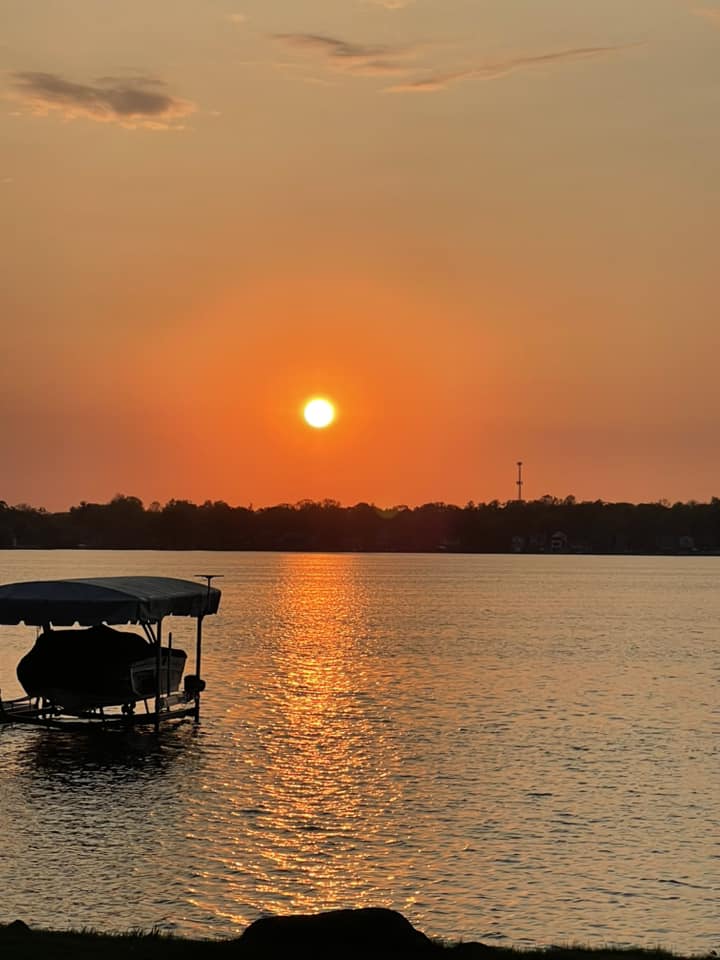The web Browser you are currently using is unsupported, and some features of this site may not work as intended. Please update to a modern browser such as Chrome, Firefox or Edge to experience all features Michigan.gov has to offer.
EGLE, MDHHS offer tips to stay healthy during poor air quality days
May 28, 2024
As the 2024 North American wildfire season continues and warmer weather increases the risk of higher ozone levels, the Michigan Department of Environment, Great Lakes, and Energy is joining with the Michigan Department of Health and Human Services (MDHHS) to provide Michigan residents steps to take to protect themselves from risks related to poor air quality.

Sunset at Lake Lansing showing effect of smoky sky in May 2023. Courtesy of Cheri Riemer.
“Last summer, Michigan experienced unique levels of poor air quality due to smoke from neighboring Canadian wildfires,” said Dr. Natasha Bagdasarian, chief medical executive. “This year, in the event that wildfire smoke reaches Michigan again, we urge residents to be proactive in checking the Air Quality Index online regularly to determine if there are any actions they should take. Other than the risk of wildfire smoke, it is still helpful to monitor the Air Quality Index for poor air quality due to other hazards such as ozone.”
The Air Quality Index (AQI), which can be found on the AirNow website, is a color-coded way for residents to see what the levels of some types of air pollution are in their area. Higher AQI values indicate there is a higher concentration of pollutants in the air and a need for Michiganders to take steps to protect their health.
Residents can also sign up for the EnviroFlash system. This subscriber system allows you to get advisories and alerts for the area you choose and send them directly to your email or through a text message.
This year, EGLE has made changes to its air quality alert system. The new system now includes air quality advisories and alerts.
Advisories will be issued when levels of ozone, PM2.5 (or both) of these pollutions falls into the Unhealthy for Sensitive Groups range.
Alerts will be issued when one or both of these pollutants get into the unhealthy, very unhealthy or hazardous range.
Check out this interview with Alec Kownacki, one of EGLE’s meteorologists, about how Michiganders can keep informed and know what to do if air quality advisories or alerts are issued.
Before a wildfire smoke event, MDHHS recommends you:
- Familiarize yourself with your forced air HVAC system or your window air conditioning unit. If it has a fresh air intake or outdoor air damper, you will need to close it during a smoke event.
- Ensure you have replacement air filters that are rated MERV-13 or higher.
- Consider purchasing a portable air cleaner. If you do not have one, you can make a do-it-yourself air filter.
- Help neighbors and family members make a plan for possible wildfire smoke.
- If you have asthma or other respiratory illnesses, heart disease, diabetes or another health condition that may make you more sensitive to wildfire smoke, talk to your health care provider ahead of time to make a plan.
- Children under the age of 18, pregnant people, outdoor workers and older people (age 60+) are also more at risk. Talk to your health care provider ahead of time to make a plan.
- Check your local fire risk and read tips from the Michigan Department of Natural Resources for preventing wildfires in Michigan.
During a poor air quality day, take action to protect your health based on the AQI Index. Some recommendations may include:
- Reduce the time you are active outdoors.
- Consider less intense activities that require less physical exertion.
- If ozone levels are unhealthy, schedule outdoor activities for the morning or evening when ozone levels are usually lower.
- In the event of wildfire smoke, avoid activities that create more fine particles indoors, including smoking cigarettes; using gas, propane or wood-burning stoves and furnaces; frying or broiling food; and burning candles or incense.
- In the event of wildfire smoke, create a clean air room. If you can’t stay cool at home, the electricity goes out or too much smoke is still getting in your home, it may be best to seek shelter elsewhere. Call Michigan 211 information on cooling centers.
For additional guidance on protecting your health during poor air quality visit the MDHHS Health and Wildfire webpage.